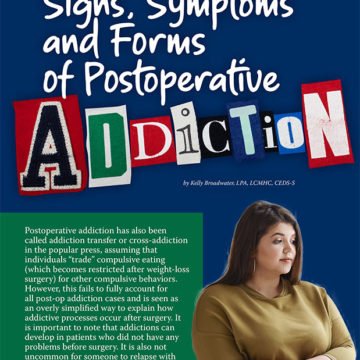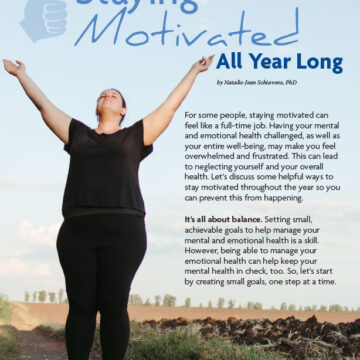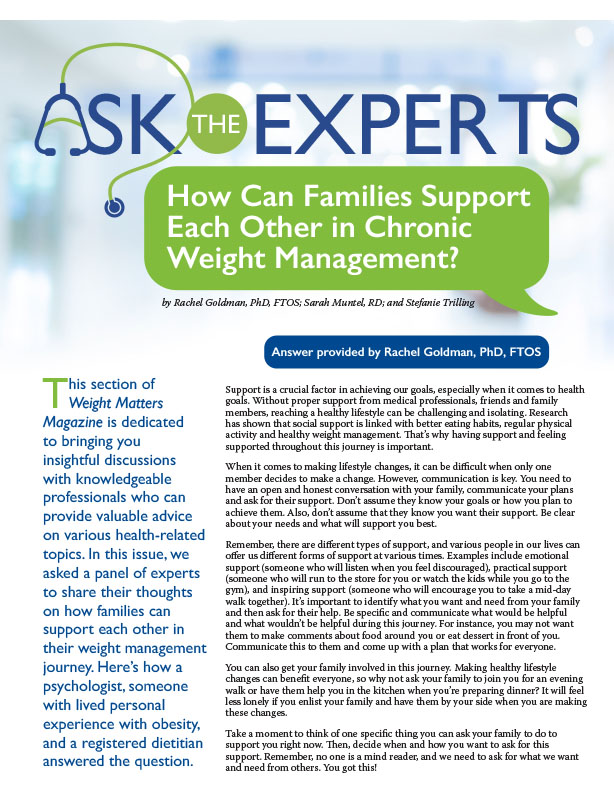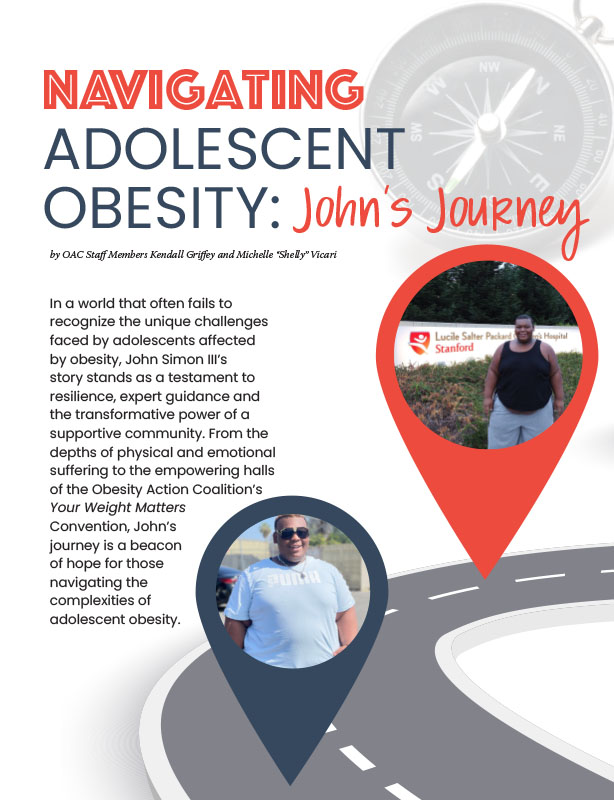Community Perspectives: Treating Obesity is a Journey

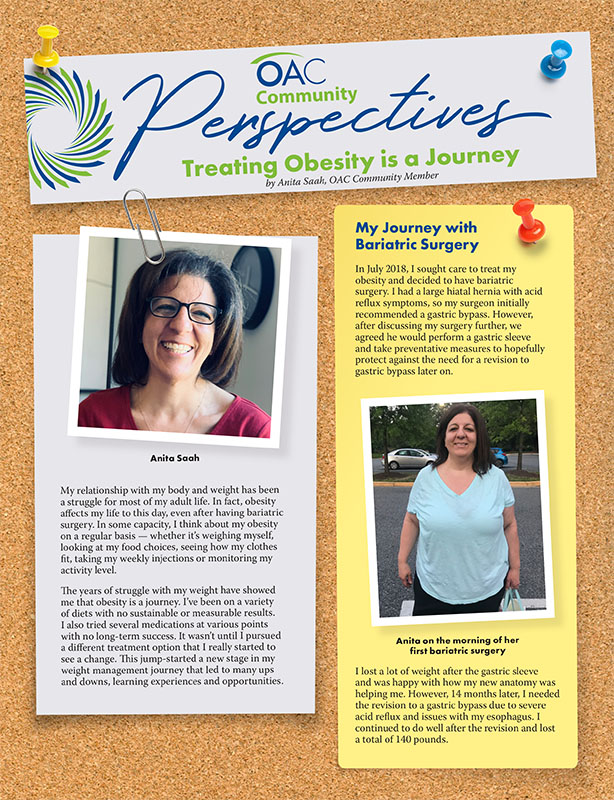
by Anita Saah, OAC Community Member
Spring 2023
My relationship with my body and weight has been a struggle for most of my adult life. In fact, obesity affects my life to this day, even after having bariatric surgery. In some capacity, I think about my obesity on a regular basis — whether it’s weighing myself, looking at my food choices, seeing how my clothes fit, taking my weekly injections or monitoring my activity level.
The years of struggle with my weight have showed me that obesity is a journey. I’ve been on a variety of diets with no sustainable or measurable results. I also tried several medications at various points with no long-term success. It wasn’t until I pursued a different treatment option that I really started to see a change. This jump-started a new stage in my weight management journey that led to many ups and downs, learning experiences and opportunities.
My Journey with Bariatric Surgery
In July 2018, I sought care to treat my obesity and decided to have bariatric surgery. I had a large hiatal hernia with acid reflux symptoms, so my surgeon initially recommended a gastric bypass. However, after discussing my surgery further, we agreed he would perform a gastric sleeve and take preventative measures to hopefully protect against the need for a revision to gastric bypass later on.
I lost a lot of weight after the gastric sleeve and was happy with how my new anatomy was helping me. However, 14 months later, I needed the revision to a gastric bypass due to severe acid reflux and issues with my esophagus. I continued to do well after the revision and lost a total of 140 pounds.
Since having the surgeries, I’ve reached so many non-scale victories. For instance, I no longer have sleep apnea or need a CPAP machine. I don’t need a seatbelt extender on airplanes. My cholesterol and blood pressure are both lower. It’s easier to shop in stores for clothes that fit or go to a restaurant without wondering how I’ll fit in the booth. I can participate in activities like Zumba, ice skating and rollerblading because I can move my body easier. My journey with my weight and health has taught me that there is so much more to me than a number on the scale.
Becoming Aware of Bias and Stigma
Throughout my weight-loss journey, I began working with a health psychologist to address the mental aspects of my health. In 2019, she introduced me to the OAC, which has been an incredible source of support for me ever since. I’ve been a proud part of the OAC Community for several years now and have continued to learn about obesity, weight stigma, bias and advocacy.
I’ve also learned that obesity is a disease, which I didn’t realize before finding the OAC. I became aware of all the bias and stigma I’ve faced, specifically in healthcare settings. The paper gowns were not made for people living in larger bodies. The larger-sized blood pressure cuffs were kept in a separate room. The chairs in the waiting room were too small and the tables too wobbly. I never felt comfortable going to the doctor’s office. I was ashamed of myself and refused to be weighed because the doctor would just tell me to eat less and move more.
Had it not been for the OAC and my health psychologist, I would have continued to carry this shame and never would have found my passion for advocacy.
Changing Treatment Approaches
After a slight regain over the years, I started a new medication in 2021 to treat my obesity. I’ve lost roughly 35 pounds in the last year and a half and am now 10 pounds from my lowest weight since having bariatric surgery. It has been quite the journey!
However, with time, I’ve also faced some chronic health issues. Since my two bariatric surgeries, I’ve had five additional surgeries for emergency bowel obstructions, intestinal problems, different types of hernias, and gastrointestinal neuropathy due to adhesions from having multiple operations. I continue to see my doctors to manage my symptoms, but I have no regret for my decision to have bariatric surgery. Without it, I don’t believe I would have been able to lose 140 pounds.
There is NO shame in having surgery or using anti-obesity medications to assist with weight-loss. Obesity is a chronic and complex disease, but there are effective and science-based tools to help you manage your weight and health. While these options aren’t for everyone, I’m certainly glad they are available to some. However, we have more work to do in making these tools more accessible through healthcare providers and insurance carriers.
The Importance of Mental Health
I’m currently working with a healthcare psychologist to support me in my ongoing journey with obesity. On the days I couldn’t stop hating my body (specifically my legs), my therapist would remind me of all the ways my legs have been good to me and all the situations they’ve gotten me out of. We even wrote “An Ode to My Legs” during one meaningful conversation. I really took that point of view to heart and haven’t looked at my legs negatively since that day.
Without question, surgery and medication can help you lose weight, but they don’t help with behaviors like emotional eating. I believe that mental healthcare is a crucial part of the weight-loss journey for this very reason. I’m learning self-acceptance, self-compassion, and how my behaviors relate to my eating habits. I’m learning not to judge myself. There are no “wagons” to fall off of. I’ve also learned that movement, no matter how small, adds up.
My health psychologist has taught me to focus on consistency over perfection, and this has really stuck with me. I no longer stress about the number on the scale or hate my body. I certainly have more work to do as far as actually loving my body, but I’ve come a long way. One of my ongoing challenges is to not let negative thoughts take up space in my head.
Being Supported and Empowered Through the OAC Community
The OAC Community has also been a huge part of my support system since I was first introduced to it in 2019. From the in-person and virtual Conventions to the year-round connections I’ve made with incredible people, I always feel a sense of belonging. The OAC Community is a no-judgment zone with people sharing similar experiences. They are kind, passionate, and fighting hard to eliminate weight bias while increasing awareness and education around obesity.
I think it’s particularly important to emphasize that I’ve used multiple tools to get to where I am today. Obesity doesn’t have a one-size-fits-all solution to treatment. Being open about my health complications is not meant to deter anyone from seeking bariatric surgery. On the contrary, I want to be transparent and show others how I’ve overcome these obstacles.
Becoming an advocate has made it important for me to continue sharing my story with others in hopes that at least one person will benefit. Even if just one person starts to feel like they’re not alone, it’s worth being vulnerable and sharing what I’ve gone through.
Do You Want to Share Your Story?
Whether you have a story about navigating obesity, facing weight stigma, or inspiring others, your voice is important. Visit the OAC’s story project at WeightoftheWorld.com to share yours today. Not sure what to say? Consider one of our question prompts to guide you.
If you would like your story to be featured in a future issue of Weight Matters Magazine, please email membership@obesityaction.org.
by Robyn Pashby, PhD Winter 2024 “No one is ever going to date you if you don’t…
Read Articleby Rachel Goldman, PhD, FTOS; Sarah Muntel, RD; and Stefanie Trilling Winter 2024 This section of Weight…
Read Articleby OAC Staff Members Kendall Griffey and Michelle “Shelly” Vicari Winter 2024 In a world that often…
Read Article




